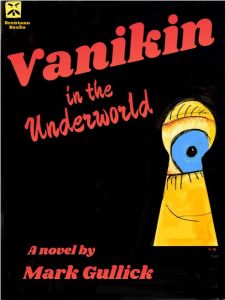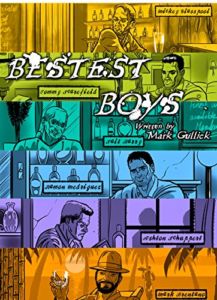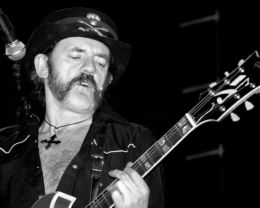How I Met Lemmy Kilmister: An Interview with Mark Gullick
Posted By Ondrej Mann On In North American New Right | Comments Disabled3,707 words
Mark Gullick [2] is a rarity for Counter-Currents. He is a professional writer and an expert on the English cultural milieu. Mark is mainly interested in current politics, but his interests also include bars, travel, funny stories, philosophy, Tarot [3], adventure, and professional literature. Let’s get to know him better.
Ondrej Mann: Could you introduce yourself to the readers?
Mark Gullick: I am 61, from London, England. I have a Ph.D. in Philosophy. I live in Costa Rica because England — and Europe — is mostly finished.
In England I lived for ten years on a canal boat, managed the bar of a famous restaurant, and was in a coma for two days after a car crash.
I am also a musician and I read Tarot cards.
In the last year, I have written for American Renaissance, Counter-Currents, New English Review, The Occidental Observe, Taki’s Magazine, and VDare.
OM: You recently changed your residence. What are the advantages of living in Costa Rica compared to living in London?
MG: The cost of living is far lower. My rent is $50 per week. That said, the place does flood occasionally, as I live a meter below sea level and the Pacific Ocean is at the end of my street. There is inflation here, but it is nothing like that in Europe or the United States. I am reclusive, but I like the fact that there are neither of the problem communities I found difficult to live around in London, namely blacks and Muslims. The weather, of course, is going to be an advantage as winter draws on in the US and Europe, and the energy looks likely to fail.
OM: Do you have any family? How does your extended family see your political views?
MG: My father died ten years ago and described himself as what we call in England a “small-c conservative.” As the child rebels against the father (see Freud), I pretended I was Left-wing for a few years.
My mother is staunchly Right-wing and believes in the death penalty, almost down to dropping litter. She is 82 and knits coats for small dogs in a Transylvanian animal sanctuary. She also has an entire bookshelf full of books on serial killers. She is an expert. She doesn’t like my political stance as it gets me into trouble and, as she rightly points out, I have quite enough of that in my life just with my day-to-day behavior.
My father’s daughter from his first marriage (my half-sister) no longer talks to me. She married a Turk and moved there, and she didn’t appreciate my online comments about Islam. We no longer speak.
I have two younger brothers, and they are identical twins. One lives in England, and has no opinion on my politics. He just praises me as a writer, and is my best friend. The other brother lives in Sweden and it has taken him a long time to accept the effects of Islamic immigration there. We therefore had a few minor arguments.
OM: How is your brother’s relationship with Islam now?
MG: I don’t know. We don’t really talk, and I suspect that is part of the reason. Sweden is a very immature country. You can remain 17 years old there forever. When he moved there 35 or so years ago, a rape would make the front pages of the newspapers. Now Sweden has the second-highest rape figures in Europe, I believe.
 [4]
[4]
OM: When you were in England, how did you perceive nationalist political parties? Did you go to the polls?
MG: I voted Labour as a young man, not realizing that they would turn into a party that hated Britain. And when anyone on the political Right says “hating Britain,” they mean “hating England.” I don’t consider myself British. I am English.
The last party that did anything constructive, I believe, was UKIP. They won the Brexit referendum and I admire Nigel Farage.
Nationalism is gradually being marginalized when it comes to England. The Cross of St. George (the English flag) is increasingly banned in public places, while the Pride flag flies freely.
I believe England is finished as a nation — for now — which is why I live in CentroAmerica.
I am in touch with Patriotic Alternative, who are strongly nationalist, as I am writing a feature on them.
I recently wrote on a party called Reclaim [5]. They wouldn’t speak to me.
OM: What kind of politician was Nigel Farage for you? What do you admire about him? From the outside looking in, he was a pro-system politician with a few politically incorrect jokes.
MG: I think that is because you are on the outside looking in. Just as you would recognize a Czech patriot, I recognize a proud Englishman. Politicians have to play the game, to a great extent, and so Farage with his pint of beer and his cigarettes. Image, optics.
But there is such a thing as nationalistic pride, and it is a force for good. Look at Italy, and Meloni and the coalition (if it happens). And I think nationalism is the remedy to globalism, which is not a good idea.
OM: In your opinion, is Britain now completely lost? When was the turning point, and when was change still possible?
MG: The turning point was Tony Blair. That government destroyed education and made Conservatism toxic to the media classes. Many countries in the West seem to be lost, but when a collapse happens — and I believe it will soon — ordinary people will have a say in the future. Not via democracy — that is a broken toy — but through telling government that they must take a step back.
OM: And were you interested in nationalist and conservative politics before Tony Blair? How do you rate Margaret Thatcher’s policies?
MG: Thatcher was overrated, but she was the last of the pre-political class. She was also the first politician to be hated by the Left. Before, they just shouted and clenched a fist. Now — and see Trump in the US — there is a genuine toxic hatred in the air.
But Thatcher tamed the trade unions, and Labour are now finding out how difficult that is to do.
I don’t believe nationalism and conservatism are identical. If I was a nationalist, I wouldn’t be living in the Third World. But I am a conservative. Progressivism is what is rotting the world from the inside, like a tooth.
 [6]
[6]
OM: Today all resistance is forbidden and the Great Replacement is working against us. You must have noticed the grooming phenomenon. How do you see the future of England?
MG: By grooming, do you mean the Muslim child-rape gangs?
As for the future of England, Orwell writes in 1984 that “the only hope lies with the proles.” White secession has to play a large part in the future of Western civilization if it is to continue.
OM: Yes, I mean Muslim child-rape gangs. So we are heading for a collapse and it doesn’t seem to make much sense in England to devote resources to electoral struggle and contestation within democracy. Is there any hope for England? What direction should we be taking, if we live in England?
MG: It’s not so much what the British should do but what they will do, at least those who can afford to. There will be increasing white flight from the cities, and some from the country itself. Particularly in Muslim areas, the Islamic vote is essential to keeping certain politicians in power, and nothing an Islamic council, for example, does will be for the benefit of non-Muslims. This is the exact reason for the disgraceful grooming gang scandal.
OM: So you think there’s nothing to be done about the total Islamization of Britain? And it only makes sense to flee to the countryside or move out of the country?
MG: No. Into the rural areas from the cities first. Although immigrants are already starting to do that. Then leave the country. No country can defeat demographics, and compare Muslim and indigenous British birthrates.
OM: A lot of my friends are going through a mid-life crisis right now. My girlfriend’s father has isolated himself on his farm and spends his time either fixing it up or drinking a lot. A former best friend has become bitter and reached the point where nothing is possible. It’s impossible for him to get a girlfriend, change jobs, move out, or make new friends. So he just survives and grumbles. Another friend is toxic to all people and hates life and when people have fun. He’s reached the stage of being an unpleasant pensioner. The ex-lover is bitter again and only talks about pills, pain, or biting humor. How are you experiencing your midlife crisis?
MG: Mid-life crisis? I am 61! English men have their mid-life crisis at 40. I solved mine by buying a canal boat and living on the water for a decade.
OM: And did it help? What did you experience?
MG: I loved living on a canal boat. The people, the countryside, the wildlife. A wonderful ten years.
OM: Have you noted the work of Alejandro Jodorowsky and his book The Way of Tarot?
MG: Jodorowsky I discovered through Santa Sangre a couple of years ago. I loved the film, and looked him up. I saw that he was a Tarot student but I haven’t read the book. I watched some YouTube of him and he seemed a little amateurish. I don’t read the cards much — although I can and have here in Costa Rica — but I am much more of a student of Tarot. The discipline and the cards belong together, but they can be separated.
He also did this thing where he would read for people who had written to him. This is absurd. It’s like the “telephone tarot” you see in the magazines, or the online readers. You have to be with the person you are reading for and talk for some time first. If you don’t do that, the cards will have nothing to say to either of you. You don’t read the cards, they speak. And they don’t tell the future.
OM: Have you had any hilarious experiences in Tarot readings?
MG: Tarot doesn’t really lend itself to hilarious stories, but it is enjoyable. Sometimes I think I see a slight disappointment when I tell a querent (the person whose cards are being read) that Tarot is not black magic. I think sometimes people believe they are dicing with the devil for their soul, when all they are really doing is taking part in a cross between a psychological exercise and meditation. Tarot is like a séance without any ghosts.
OM: You’re a movie buff. Could you list your top five favorite films? Have you reviewed these films?
MG: Okay, five favorite films. Ask me anything you like about them. I just thought them and wrote them, because it is the kind of thing that you can spend a day on, like favorite albums. These are not in order:
Performance (1970)
Stalker (1979)
Naked (1993)
Monty Python’s Life of Brian (1979)
Last Year at Marienbad (1961)
OM: Write why you like each film. Or, what do you admire about those films in particular? And feel free to write down your other favorite films by the same directors.
MG: Five top films. Performance just put a spell on me. I must have seen it 40, 50 times over the years. Jagger is brilliant in his sneering awkwardness. You get possibly the first rock video in “Memo from Turner,” and the gangster scenes set the tone for a lot of London crime movies to come.
Stalker should really be seen on a cinema screen because visually it is as beautiful as it is disturbing. Also, the original book, Roadside Picnic, is a brilliant piece of science fiction. Russian science fiction is always low-tech: no shiny robots or gleaming spaceships, just rust and dirt. Tarkovsky hated 2001: A Space Odyssey for just that reason. When he made Solaris, he told the set designers he wanted his space station to look like a broken-down bus-stop.
Naked is a very dark film. Johnny is a beaten-up guy from Manchester who steals a car and drives to London to find his ex-girlfriend. He is a Bible-reading down-and-out with a very highly developed intelligence which he uses to torment the people who cross his path during his psychological odyssey through London’s underbelly. “Have you ever thought, right?” he asks, “that you might have already had the best moment of your whole fucking life?” The lead actor, David Thewlis, just crackles with malevolence in this movie.
Life of Brian is there not as my token comedy but because it is sheer low-budget genius. I think I know every line, and it is hard to pick a favorite scene, although John Cleese (who plays about five different roles) correcting Brian’s Latin graffiti is genuine comedic gold. I was surprised by how many Americans I met when I was first here love British comedy. Life of Brian also famously contains the line voted funniest ever in a British poll: “He’s not the Messiah, he’s a very naughty boy.”
Last Year at Marienbad is sort of my wild card here. I saw it when I had become fascinated by the novels of Alain Robbe-Grillet, who wrote the screenplay for Marienbad. The film is black-and white, takes place in a sumptuous hotel, and has no discernible plot apart from a male guest insisting to a woman (the impossibly beautiful Delphine Seyrig) that they met at the same hotel the previous year, a claim she denies. It is incredibly pretentious, not the least of its appeal. Also, it features the NIM game, also known as the Marienbad game, which is played with 16 matchsticks. If we ever meet, I’ll play you. Like the guy says in the film, it does not matter who moves first. I cannot lose.
OM: What’s your business? I know you go to the bar a lot. Do you enjoy magic tricks? It’s a surefire way to get attention and attract women.
MG: I do like magic tricks because my brother in Sweden is a magician. He really is; he is in the Swedish Magic Circle. I am too old to be bothering with women, and although I like bars I am banned from a couple here. I’m not a sex-pest; they were both for fighting.
OM: What do you consider your most valuable articles?
MG: My favorites are the music features: Joy Division [7], Killing Joke [8], The Fall [9], and Thin Lizzy [10]. I think I am a good music writer.
OM: Have you written any more philosophical articles for Counter-Currents or American Renaissance?
MG: I have written philosophical pieces for CC, New English Review, and The Occidental Observer. I am turning more to raw politics at the moment because I have this awful feeling something big is coming, and not in a nice way. It’s like the way the butterflies here disappear a bit before it rains. Something in their nature tells them that in heavy rain — and it really can rain here — they will be smashed to pieces.
 [11]
[11]
OM: Would you introduce your books to the readers?
 [12]
[12]You can buy Mark Gullick’s novel Cherub Valley here [13].
MG: First novel, Cherub Valley [14]. Written and set in 1997 London. An IT infotech is being stalked, but he doesn’t know if it is one of his work colleagues, his sadomasochistic American girlfriend, his sentient computer, or a trained assassin. Whoever I is, he likes it. Still my favorite of my books and now a quarter of a century old!
OM: And your other books?
MG: Okay, second book. Bestest Boys [15] was written about ten years ago. A drinking gang of semi-intellectuals are caught up in a riot and one of their members is killed. They look to take revenge, and what they find leads them to a dark world of child pornography at the highest levels of society.
Parts of this are autobiographical (not the violent bits!). The main character lives on a canal boat, as I did for ten years.
OM: Thank you. I’m waiting for the third one, and then we’ll move on to the next question.
 [16]
[16]You can buy Mark Gullick’s Vanikin in the Underworld here. [17]
MG: Sure. Vanikin in the Underworld [18] is about a 70-year-old philosophy professor who loses his job for writing a politically incorrect book. He retreats to a small council flat which he doesn’t leave for seven years. He becomes a guru to the residents, and when he finally emerges, the world has changed.
OM: I read Bestest Boys. The book is based on your real-life experiences in your boat bar. Do you have a funny story from your bar that you didn’t use in the book?
MG: It was the late 1980s and I was managing a bar in north London. A British metal band called Whitesnake held a wedding reception in the bar and Lemmy turned up. He asked me if he could buy a bottle of Jack Daniel’s, as he didn’t want to keep returning to the bar. I told him to sell it to him by the shot would be crazy expensive, so I would sell him a bottle at cost price with a modest mark-up for my boss.
Later, he asked me where the toilet was and I told him. He asked me again and I repeated the directions. Then he asked me to show him where they were. So I took him and showed him. He asked me to come into the toilet. I thought, oh, surely Lemmy’s not gay. He wasn’t, he just wanted to give me a huge snort of speed (amphetamine sulfate), which made the evening go with a bang.
OM: That’s a good story. Have you met other famous people in your life?
MG: Have I met famous people. Okay, they are all British and may not be known to American readers, but here is a list, in alphabetical order. Adam Ant. Michael Aspel (only English people of my age will be even vaguely aware of him, but he babysat me once). The Clash. Ian Curtis. Ray Davies. Chris Eubank. Paul Heaton (who used to be a good drinking buddy). Morrissey. Lionel Shriver. Lady Diana Spencer. Then there are people I have only met in the sense I have served them in bars. Helena Bonham-Carter. Anthony Hopkins. Lemmy (as noted; we took the substance straight off his front door key, I recall). Dr. Jonathan Miller. And, last but not least because it was such a kick, the bass player with the big moustache out of Hall and Oates. Either Hall or Oates. I had better make sure everyone knows I am kidding there. You never know.
 [19]
[19]You can buy Mark Gullick’s Bestest Boys here [20].
OM: What philosophical issues interest you most, personally? And which philosophers have most interested you? What are the main topics of philosophy in the twenty-first century?
MG: As for philosophy, it took me a long time to realize that I was less interested in philosophy than I was in its history. If you read a history of, say, civil engineering, you will see a clear line of progress and improvement. Bridge A will probably be more likely to fall down that Bridge B built a hundred years later. This doesn’t happen with philosophy. It does not exhibit a clear progressus if you take away the parts of the discipline that directly fed into technology. Morality, metaphysics — they still fly around like a pinball. Obviously, that is because philosophy deals in the abstract. The danger comes when neo-Marxists start playing with making in abstracto become in concreto, changing the world and not just interpreting it. A lot of countries have picked up the tab for that little philosophical fortune-cookie jingle.
My mother used to push me in my stroller (called “push-chairs” then) right past Marx’s tomb in Highgate Cemetery, where that phrase is inscribed beneath Marx’s chiseled mug. My mother said I didn’t like the face and turned away. The main topic for philosophy now, for me, can only be the unpicking of the new Left’s mangling of epistemology. Well, they have hijacked it from people who should know better. What can and can’t be true used to be a fairly straightforward affair, like laying out a deck of cards for a game of solitaire. Things have changed, and recently. The two years of Covid gave an accelerant to the way the Left have genetically engineered the truth.
In the end, I always come back to metaphysics, like comfort food or an old dressing-gown that is all shabby but feels like home. I like the pointlessness of it, actually. Someone will doubtless put me right, but I think it was Lord McCauley who described a metaphysician as “a blind man in a dark room looking for a black hat which is not there.” There are worse ways to spend your time.
OM: What is your relationship to White Nationalism? Although Counter-Currents is a White Nationalist site, many of the writers on this site are not White Nationalists. They just loathe cuckservatives and social justice warriors, for example. What attracts conservative writers to sites like Counter-Currents?
MG: White Nationalism is an interesting question, and I don’t mean that to be condescending. It is not the purity of whiteness that is the genetic coding, as it were; it is the ritual performance of the best aspects of white culture that count. I have been to enough soccer matches and seen enough white men who are essentially only a hop, skip, and a jump away from being retarded to realize that whiteness may be a necessary but not a sufficient cause of any future lifeboat for those who wish to avoid a return to pre-Medieval times.
Your final question, about what attracts conservative writers to Counter-Currents in particular. Anyone who has read my work at CC will stifle a yawn as a I repeat, yet again, Jonathan Bowden’s comment that CC is an “online university.” Bowden was a writer I discovered via CC, along with many others, and if the cultural pendulum ever swings back from vacuous to meaningful, and young people realize that a (non-STEM) university degree is worse than useless, then a university available at a screen touch — and not duct-taped to a chair by “woke” or whatever silliness reigns this week — really does offer what used to be claimed of Oxbridge, “the glittering prizes.”
* * *
Like all journals of dissident ideas, Counter-Currents depends on the support of readers like you. Help us compete with the censors of the Left and the violent accelerationists of the Right with a donation today. (The easiest way to help is with an e-check donation. All you need is your checkbook.)
For other ways to donate, click here [21].
